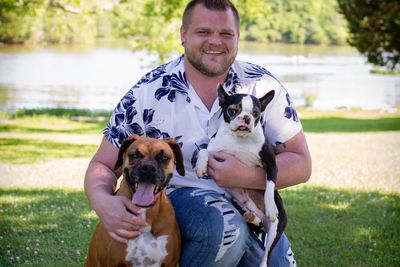Sometimes Josh Chadd wakes up feeling like a badass. Sometimes, he can’t find a good reason to get out of bed, so he doesn’t.
“I have battled depression and anxiety since long before COVID-19, and I knew this would not be pretty for me,” Chadd said.
The this he’s referring to is the pandemic-induced isolation he and millions of people around the globe have experienced since COVID-19 sent the world into lockdown early this year.
Prior to the pandemic, Chadd, 31, worked at a busy hospital some sixty hours a week, mostly on his feet and surrounded by people. Then, amid ‘safer at home’ orders, he switched jobs and started working from home as an admissions coordinator.
His new job requires very few phone calls or video meetings, other than a weekly chat with his boss. Most days he works in silence with his dog nearby, or listens to music—usually a few songs on repeat.
The sudden changes have been challenging.
“I tried to prepare for the storm mentally - reminding myself over and over that this is just temporary,” he said.
Still, it’s been hard.
Chadd misses his friends, his favorite bar, Canvas, and his gay family—or “gamily,” as he lovingly refers to them.
He reaches out from isolation occasionally to check in with friends via text or through social media. Sometimes they get back to him, he said. Sometimes they don’t.
To fill idle time, he’s been cleaning and decluttering around his house and looking for excuses to step outside for fresh air from time to time. Some days he sits and cries for no apparent reason.
“There is no shame in needing antidepressants,” Chadd said.
When craving connection, Chadd sometimes turns to Tinder for conversation with other local shut-ins. But, even though he’s had some “really good conversations,” he said texting can only scratch part of the itch.
“Having to communicate via social networks, text, and email becomes exhausting,” Chadd said. “Even more so when, at the end of the day, all I want is to cuddle.”
Exhausting as it may be, Chadd said he has hooked up with a few guys over the last couple of months—but only after he was confident that they, like him, had no symptoms of COVID-19 and had been practicing social distancing and other recommended safety measures meant to flatten the curve.
“Thinking back, I realize that probably wasn’t the smartest thing to do,” Chadd said. “This has been hard though, and I must admit while these hookups were not necessarily intimate, they have kept me from falling off the deep end.”
Though the silence and sameness of life in lockdown can be maddening, Chadd said it has given him a chance to step back and evaluate parts of his life including his friendships.
“While I feel like I have lost touch with a lot of people these past few months, I am hopeful we can maybe pick up somewhere around where we left off,” he said. “I don’t blame my friends for not being as present as I had hoped. It’s a two-way street and some days I have not felt like I could even be around another person, let alone carry on a conversation with them.”
Ultimately, isolation has created space for self-reflection and some significant realizations, Chadd said.
“It’s okay to be angry at things you don’t have control over, so long as you don’t allow those things to control you,” Chadd said. “Any growth is good, even if it’s painful or not what you had hoped for.”
This article has been supported by a grant from the Facebook Journalism Project for COVID-19 coverage.
